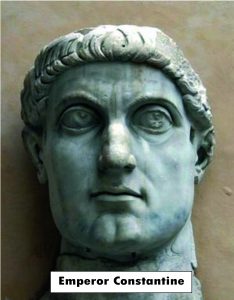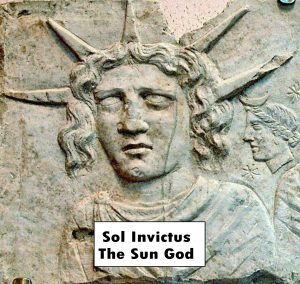The first Council of Nicea, instituted by Constantine in 325 AD, is one of the best known events in early Christianity. It is often credited with forming the current accepted Canon of Scripture, and with being the start of fully Orthodox and organised Christianity. In reality, it marks the beginning of Church as an alternative to Christianity.
It is important to put Nicea into context with other key dates of the period. In 312 Constantine was victorious at the Battle of Milvian Bridge.This is the  famous battle which he declared he had won in the Name of Jesus, a claim that made it possible for him to begin winning Christians over to his new Universal (Latin catholicus) Religion. The Milvian Bridge victory did not bring Constantine total control over the Roman Empire; he still had to accommodate Licinius I who ruled the Eastern Empire. The two were very uneasy allies. Together they promulgated the Edict of Milan in the year following Milvian Bridge, removing Christianity’s illegal status. For both of them this was a natural political move, a first step to bring Christianity under the control of the Empire. They were both well aware that the intense persecution of Christians under Diocletian had served only to strengthen Christianity.
famous battle which he declared he had won in the Name of Jesus, a claim that made it possible for him to begin winning Christians over to his new Universal (Latin catholicus) Religion. The Milvian Bridge victory did not bring Constantine total control over the Roman Empire; he still had to accommodate Licinius I who ruled the Eastern Empire. The two were very uneasy allies. Together they promulgated the Edict of Milan in the year following Milvian Bridge, removing Christianity’s illegal status. For both of them this was a natural political move, a first step to bring Christianity under the control of the Empire. They were both well aware that the intense persecution of Christians under Diocletian had served only to strengthen Christianity.
Eight years after the Milan Edict, in 321 AD, Constantine ordered that the Day of Rest be moved from the Sabbath, or Seventh Day, on Saturday, to the day of the Sun God, Sol Invictus , on Sunday. This is the reason that the Churches today still keep Sunday as if it were the Sabbath. The Seventh Day Sabbath is a principle that goes back to Creation itself. Even though the early Christians sometimes met on the first day of the week for particular reasons, such as to see Paul off on one of his journeys, or to collect donations, there is no Scriptural basis whatever for a change of the Sabbath Day. It is important to be aware that this momentous change was not made by the early Christians nor by the Council of Nicea, but by diktat of Constantine himself, in favour of the Sun God. Constantine retained his commitment to Paganism, and this far reaching change to the calendar is profound evidence of that.
, on Sunday. This is the reason that the Churches today still keep Sunday as if it were the Sabbath. The Seventh Day Sabbath is a principle that goes back to Creation itself. Even though the early Christians sometimes met on the first day of the week for particular reasons, such as to see Paul off on one of his journeys, or to collect donations, there is no Scriptural basis whatever for a change of the Sabbath Day. It is important to be aware that this momentous change was not made by the early Christians nor by the Council of Nicea, but by diktat of Constantine himself, in favour of the Sun God. Constantine retained his commitment to Paganism, and this far reaching change to the calendar is profound evidence of that.
Another three years passed to 324, when Constantine finally defeated Licinius at the Battle of Chrysopolis. He was now the undisputed leader of the whole Roman Empire. The very next year, 325, he called together Christians from across the Empire to the Council of Nicea, over which he himself presided. The purpose was to consolidate his control, religious as well as military and political, over the entire Empire.
One can only surmise what the real feelings of those attending Nicea were. For those who had no real faith, just being in a big Imperial Convention, with free travel provided, would have been enough. Others, with real faith, may have hoped that Nicea would be a step forward for Christianity, and certainly a full turnaround from earlier persecutions. Others must have seen it as a Poison Chalice; a Christian gathering sitting at the feet of an all-powerful Sun god worshipper. Whatever they all thought, they would have been acutely aware of who was in charge. Would they have felt free to express their real thoughts? And how many Christians kept well clear from what they saw correctly as a take-over of their Faith? Opposition to the “Constantinian Shift”, as some Theologians have dubbed it, continued for many years, but was eventually suppressed.
The Council did not adopt the Canon of Scripture as we have it today. The gathering discussed some controversial issues of the day, settled the date of Easter, and produced the Nicean Creed. But its key achievement, both the most significant and longest lasting, was the confirmation of Constantine, a political and military Head of State, as Head of the Church. True Christianity, which looks only to Jesus, was the loser.
For more on Constantine, Church and Christianity see Constantine’s Hijack of Christianity if you haven’t already. Also Christianity is NOT Violent and Is Christianity a Religion? No, it’s a Relationship with Jesus.
